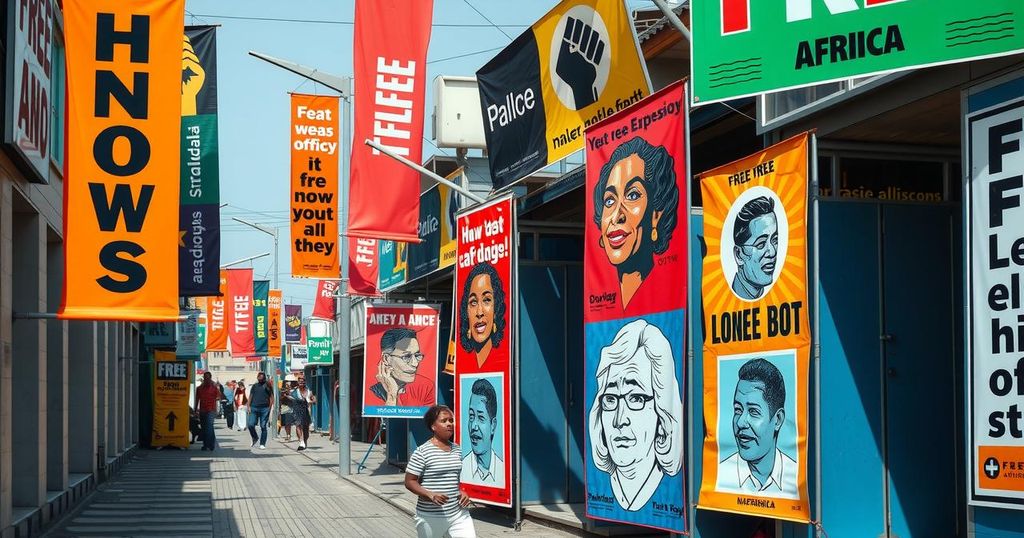Kenya-Tanzania Rift over Activist’s Deportation Ignites Debate on Free Expression
The deportation of Kenyan activist Boniface Mwangi has intensified a rift between Kenya and Tanzania, revealing deeper issues regarding free expression in East Africa. The incident prompted a satirical backlash from Kenyans, while Tanzanian officials condemned ‘imported activism.’ As tensions rise, the capacity for regional dialogue and solidarity hangs in the balance amid a burgeoning landscape of digital activism.
Tensions between Kenya and Tanzania have escalated following the controversial deportation of Kenyan activist Boniface Mwangi. The Tanzanian government accused Mwangi of “external interference” as he arrived to participate in a court hearing for opposition leader Tundu Lissu. This action, which was intended to intimidate other activists, instead ignited a wave of online satire from Kenyans, who responded with memes and comedic parodies of Tanzanian President Samia Suluhu.
The situation prompted a swift backlash from Tanzanian legislators. Their ire was directed not at Nairobi, which maintained a largely muted response, but at what they termed “imported activism.” Some MPs expressed discontent, with Geita MP Joseph Musukuma suggesting there was little Kenya could offer Tanzania. Singida West MP Elibariki Kingu reminded his Kenyan counterparts of Tanzania’s historical role as a peacemaker during Kenya’s 2007 post-election turmoil.
This ironic twist stands out given Tanzania’s legacy under its founding father, Julius Nyerere, championed for pan-African solidarity, having previously supported liberation struggles in the region. Today’s reaction flows from a stark contrast, where the country exhibits a defensive stance to cross-border solidarity, indicating a significant shift in its diplomatic tone.
In examining the broader landscape of East Africa, the current dilemma represents not just a challenge to state sovereignty, but an emerging contest over the sovereignty of ideas. The civic scene is evolving rapidly, with shrinking freedoms underscoring the importance of who gets to voice dissent and how that is to be expressed.
Kenya’s utilize of satire and social media has proven effective over the years as a form of informal checks on authority. In stark comparison, Tanzania has implemented a conservative and often oppressive strategy towards dissent, under the long reign of the Chama Cha Mapinduzi (CCM). The rise of digital activism significantly impacts this disparity, especially as meme culture continues to expand the civic space.
A pressing question emerges now: What occurs when digital activism outstrips the efforts of traditional diplomacy? The present situation highlights that grassroots sentiments now frequently overshadow official state communications. The complexities of East African integration are further illuminated as regional leaders face public outcry rather than consolidating dialogue.
What is particularly striking is that the solidarity rallying citizens is rising outside the confines of formal governance—fueled by the technology in their pockets, WhatsApp communications, and a spirited youth. Historically, we find ourselves at a pivotal crossroads: will regional authorities pivot towards accommodating these shifts or retreat further into nationalism? The clock is ticking for meaningful engagement.
The rift between Kenya and Tanzania has sparked significant discussions about free expression and cross-border activism. Boniface Mwangi’s deportation has highlighted the differing approaches to dissent in the region. The swift public response from Kenyans showcases a robust civic engagement, while Tanzanian officials react defensively to perceived outside influences. The situation underlines ongoing tensions within East Africa as digital activism gains momentum, raising vital questions about the future of regional solidarity and the role of diplomacy.
Original Source: eastleighvoice.co.ke




Post Comment